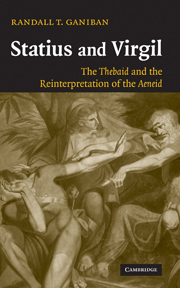Book contents
- Frontmatter
- Contents
- Preface
- List of abbreviations
- 1 Introduction
- 2 Oedipus' curse
- 3 Horror, prophecy, and the gods
- 4 Hypsipyle's narrative of nefas
- 5 Bacchus and the outbreak of war
- 6 Dis and the domination of hell
- 7 Delay and the rout of Pietas
- 8 Spectacle, crime, and monarchy at Thebes
- 9 Pietas, burial, and clementia in a world of nefas
- Works cited
- General index
- Index locorum
1 - Introduction
Published online by Cambridge University Press: 22 September 2009
- Frontmatter
- Contents
- Preface
- List of abbreviations
- 1 Introduction
- 2 Oedipus' curse
- 3 Horror, prophecy, and the gods
- 4 Hypsipyle's narrative of nefas
- 5 Bacchus and the outbreak of war
- 6 Dis and the domination of hell
- 7 Delay and the rout of Pietas
- 8 Spectacle, crime, and monarchy at Thebes
- 9 Pietas, burial, and clementia in a world of nefas
- Works cited
- General index
- Index locorum
Summary
The sparks that warmed me, the seeds of my ardor, were from the holy fire – the same that gave more than a thousand poets light and flame.
I speak of the Aeneid; when I wrote verse, it was mother to me, it was nurse; my work, without it, would not weigh an ounce.
So says Statius about the Aeneid's influence on him. These words, however, come not from his verse but from The Divine Comedy. When the character Statius encounters Dante and Virgil in Purgatory 21, he praises Virgil's work and explains its religious importance for him. When living, Statius had secretly converted to Christianity because of Virgil's Fourth Eclogue, which he took to foretell the birth of Christ. As a result, Virgil was not only a defining poetic influence but a significant religious one as well: “Through you I was a poet, through you a Christian.”
Dante's reinterpretations of Virgil's Eclogue and of Statius' religious life are of course anachronistic: Virgil's Fourth Eclogue could not have foreseen the birth of Christ, nor was Statius a Christian convert. If, however, we set aside these ahistorical elements, the passage articulates ideas about poetic influence that are important for the study of the Thebaid. First, the encounter in the Purgatory dramatizes the influence that Virgil in fact had on Statius. Second, it exemplifies how poems can offer reinterpretations of earlier works. And finally, it illustrates how poets can engage in artistic rivalry even as they praise their predecessors and models.
- Type
- Chapter
- Information
- Statius and VirgilThe Thebaid and the Reinterpretation of the Aeneid, pp. 1 - 23Publisher: Cambridge University PressPrint publication year: 2007



